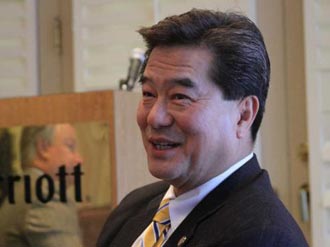A Republican who has successfully reestablished his business career after a 2006 bankruptcy will become the first Korean American to seek a Senate seat from Georgia when he declares his candidacy Friday.
Augusta businessman Eugene Chin Yu, 60, will face an uphill primary battle against a GOP field that includes congressmen Paul Gingrey, Paul Broun and Jack Kingston, as well as former Georgia Secretary of State Karen Handel, for the seat being vacated by retiring Sen. Saxby Chambliss.
Yu, a political novice, will have the backing of Georgia’s rapidly growing Korean and other Asian communities. As a past president of the Federation of Korean Associations, an umbrella organization for the many Korean community organizations across the US, he will also receive that endorsement. Perhaps more importantly from the perspective of the majority of voters whose support Yu will need, he has positioned himself as someone who can attract to Georgia more jobs and contracts from Kia Motors, its major suppliers and other Korean corporations.
Yu may find a degree of acceptance among Georgia voters thanks to his credentials as a good ol’ boy who has been an Augusta resident for 41 years. He immigrated from Korea in 1972 in time to graduate from Augusta’s Butler High School. He then joined the US Army and served as a military policeman (MP). Back in civilian life he worked as a Richmond County fireman and as a Richmond County police deputy. He later graduated from Harvard’s Executive MBA program.
For a time Yu worked as a sales representative for Cummins Military Systems, a company that rebuilt old M35 transport trucks and sold them to the US Army and the militaries of some foreign nations. During the early 90s he was involved in building a Korean War memorial in Augusta. In 1994 Cummins lost a major contract and was forced to liquidate. Yu and wife Jonie put together an investment group to buy its assets and restart it.
In the late 1990s Yu became a liaison between local economic developers and a major Korean firm called Hankook Synthetics which announced plans to build a $1.2 billion polyester fiber plant in Augusta. The publicity Yu garnered for that project gave him a taste of being a public personage, as well as a sense of the local hunger for companies capable of creating well-paying jobs. Unfortunately, Hankook’s plans fell through.
Meanwhile Yu’s own Cummins Military System suffered a major setback of its own in early 2004 when a local court upheld a $1.2-million judgment in favor of a Venezuelan firm that had brokered a contract with the Venezuelan government. That contract had fallen through when CMS’s lender revoked a letter of credit, but Cummins’s obligation to pay the brokerage fee remained valid, the court ruled.
The judgment was more than CMS could afford to pay and continue operations. To avoid being forced out of business, Yu placed CMS into Chapter 11. That caused a downward spiral as lenders and suppliers pulled back credit. By 2006 CMS was moved into chapter 7 bankruptcy. Among the assets liquidated to pay off $4 million in unsecured debts was a 114-acre lot and plant facilities on Mike Padgett Highway and Windsor Spring Road in Augusta.
Yu found work as a consultant to a company that supplied armored vehicles to the Korean and Egyptian militaries called General Purposes Vehicles. He eventually also founded another business called Continental Military Supplies to sell armaments internationally.
More recently, perhaps in prelude to seeking political office, Yu has become a prominent economic booster for the August-Aiken area. One of his announced goals has been to bring to the area more first- and second-tier suppliers for Kia Motors’ Georgia plant in nearby West Point, Georgia. His efforts have included hosting visits by Kia executives. He has made much of the fact that as home of the US Open, Augusta is one of the 10 cities most recognized in Korea where golf is practically a religion among many corporate business executives.
It remains to be seen whether Yu’s perceived access to Korean firms that can bring more jobs to Georgia is enough to overcome the political experience and statewide name-recognition of his opponents. It will also be interesting to see what impact his earlier business failure will have on a race that will likely focus heavily on economic issues.


